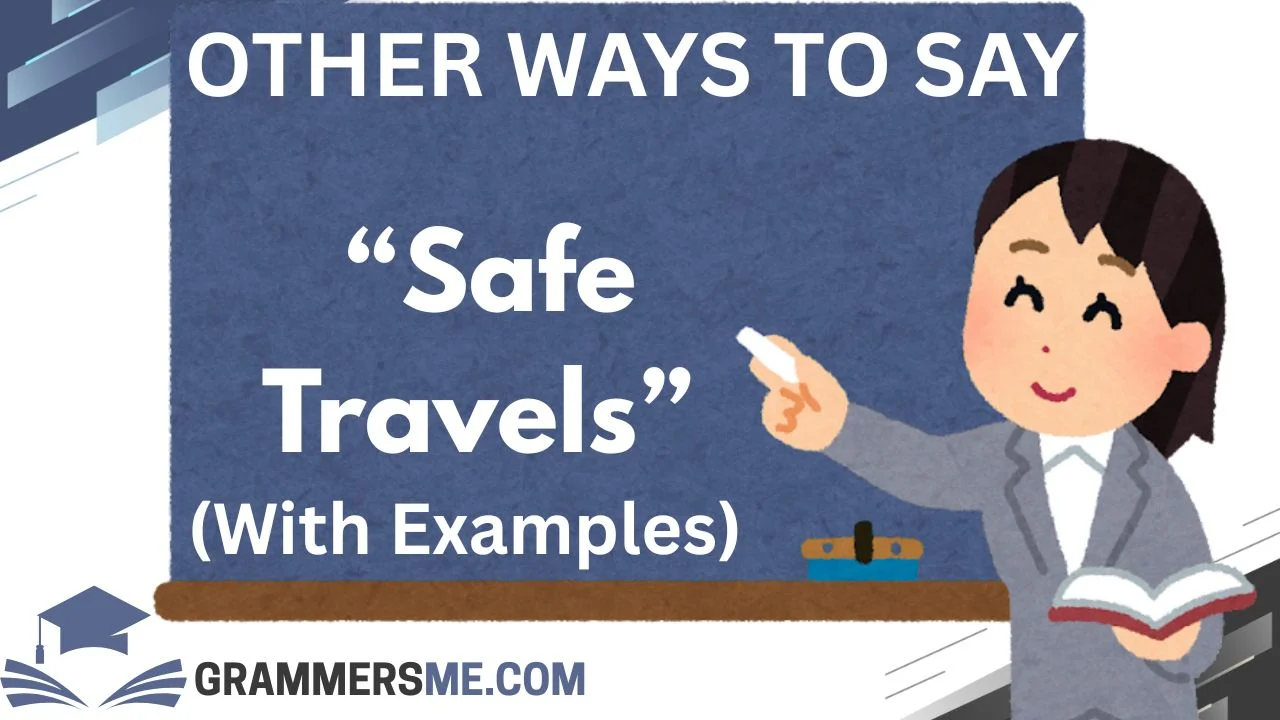When someone you care about is about to embark on a journey, it’s natural to want to offer words of encouragement and care. However, the classic “safe travels” can sometimes feel a little generic. Finding the right way to express your wish for someone’s safe journey can make your message feel more personal and meaningful.
Whether you’re sending someone off for a vacation, business trip, or simply a weekend getaway, it’s always nice to mix things up a little and offer your warmest wishes in a unique way. Below are 30 thoughtful alternatives to saying “safe travels,” each with its own special touch. You can make your message more heartfelt and memorable with these thoughtful phrases.
What Does “Safe Travels” Mean?
“Safe travels” is a common expression used to wish someone a secure and worry-free journey. It’s a phrase rooted in concern and kindness, offering the hope that the person will have a smooth, safe trip with no unforeseen issues. This phrase is generally used before someone heads off on a trip, whether it’s a short journey or an extended adventure.
Is It Professional/Polite to Say “Safe Travels”?
Yes, it’s perfectly polite and professional to say “safe travels” when bidding someone farewell before a trip. It conveys well-wishing without being overly personal or informal. In a professional setting, this phrase can be appropriate for colleagues, clients, or even bosses who are leaving for a business trip. It strikes the right balance between care and professionalism.
1. Bon Voyage
- Meaning: French for “Have a good trip,” this phrase has become a popular way to wish someone a pleasant and enjoyable journey.
- Detailed Explanation: Often associated with elegance, this phrase implies a wish for a joyful and memorable adventure.
- Scenario Examples: A friend heads off for a European vacation, and you say, “Bon voyage! Enjoy every moment!”
- Best Use: Casual or semi-formal situations, especially when you want to add a touch of class.
- Not Use: In overly formal professional settings.
2. Have a Wonderful Journey
- Meaning: A warm and enthusiastic wish for a trip filled with happiness and smooth sailing.
- Detailed Explanation: This phrase emphasizes the joy and beauty of the journey ahead.
- Scenario Examples: Sending a family member off for a long holiday, you might say, “Have a wonderful journey. I can’t wait to hear all about it!”
- Best Use: Used with friends or family for more personalized communication.
- Not Use: In very formal professional contexts.
3. Travel Safely
- Meaning: A straightforward and practical wish for safety.
- Detailed Explanation: Focuses directly on the idea of safe travels and expresses genuine concern for the person’s well-being.
- Scenario Examples: “I know you’ll be driving long distances—travel safely and take breaks!”
- Best Use: When you know the person may be traveling by car or other means that require extra caution.
- Not Use: When you want a more lighthearted or cheerful tone.
4. Wishing You Smooth Sailing
- Meaning: A nautical metaphor, wishing for an easy and pleasant journey.
- Detailed Explanation: This phrase is often used in casual conversations and evokes imagery of a calm, trouble-free trip.
- Scenario Examples: “Wishing you smooth sailing as you head to your new home across the country!”
- Best Use: In casual settings with friends or family, especially when traveling by sea or air.
- Not Use: In a formal or professional context.
5. Safe Travels Ahead
- Meaning: A reassuring wish for a safe trip.
- Detailed Explanation: Similar to “safe travels,” but the use of “ahead” implies anticipation of the journey.
- Scenario Examples: “Safe travels ahead, and I hope you have an amazing time!”
- Best Use: Perfect for sending off someone who’s about to embark on a longer journey.
- Not Use: When you want to sound overly formal.
6. Enjoy the Adventure
- Meaning: A friendly and energetic wish that highlights the excitement of the trip.
- Detailed Explanation: This phrase adds a sense of adventure to the journey, wishing the traveler fun and exploration.
- Scenario Examples: “Enjoy the adventure, and don’t forget to take lots of photos!”
- Best Use: When someone is embarking on a trip filled with exploration, like a backpacking tour or road trip.
- Not Use: For business-related travel or formal events.
7. Have an Amazing Trip
- Meaning: A straightforward wish for a fantastic and unforgettable journey.
- Detailed Explanation: This phrase is full of optimism and hope for a fulfilling experience.
- Scenario Examples: “Have an amazing trip to Paris! I know you’ll love it.”
- Best Use: Casual settings with friends, family, or close colleagues.
- Not Use: When you want to sound overly formal or serious.
8. Take Care on the Road
- Meaning: A friendly and caring wish for someone traveling by car or other land-based transport.
- Detailed Explanation: This phrase implies an extra layer of concern for road safety.
- Scenario Examples: “Take care on the road and make sure to drive safely!”
- Best Use: When you know someone is driving or traveling by other forms of ground transport.
- Not Use: For air or sea travel.
9. Godspeed
- Meaning: A traditional phrase used to wish someone a successful and safe journey, often with a sense of urgency.
- Detailed Explanation: Rooted in olden times, this expression implies divine protection and a swift journey.
- Scenario Examples: “Godspeed on your travels; may your trip be blessed.”
- Best Use: When someone is embarking on a particularly long or challenging journey, especially with an emotional or spiritual tone.
- Not Use: For casual trips or in a lighthearted context.
10. May Your Journey Be Free of Trouble
- Meaning: A thoughtful and caring wish, emphasizing the hope for no challenges or problems during the trip.
- Detailed Explanation: This phrase shows genuine concern for the traveler’s comfort and ease.
- Scenario Examples: “May your journey be free of trouble, and I hope you have a wonderful time.”
- Best Use: When you’re sending someone off on a challenging journey, either physically or emotionally.
- Not Use: When you want a more cheerful, less serious message.
11. Have a Safe Flight
- Meaning: A specific and considerate wish for those traveling by air.
- Detailed Explanation: This is a direct way to show concern for someone’s safety in flight.
- Scenario Examples: “Have a safe flight to New York! See you when you get back.”
- Best Use: When someone is flying, whether for business or leisure.
- Not Use: For land or sea-based travel.
12. Take It Easy on Your Travels
- Meaning: A gentle reminder to pace oneself and not rush.
- Detailed Explanation: This phrase is more about urging the person to relax and enjoy the journey at their own pace.
- Scenario Examples: “Take it easy on your travels, and don’t forget to relax!”
- Best Use: When the journey is long and the person may need to unwind.
- Not Use: When the person has tight schedules or professional responsibilities during the trip.
13. Hope You Have a Safe and Pleasant Journey
- Meaning: A classic and thorough expression, wishing safety as well as enjoyment.
- Detailed Explanation: This phrase covers both safety and enjoyment, offering a well-rounded wish.
- Scenario Examples: “Hope you have a safe and pleasant journey on your road trip through the countryside!”
- Best Use: When you want to convey both concern and positive energy.
- Not Use: In situations where brevity is required.
14. Bon Voyage!
- Meaning: A French phrase that has become synonymous with wishing someone a good trip, particularly for holidays.
- Detailed Explanation: This expression feels festive and celebratory, making it perfect for vacation send-offs.
- Scenario Examples: “Bon voyage! Enjoy every moment of your vacation.”
- Best Use: For casual or festive occasions.
- Not Use: For formal work-related trips.
15. May the Road Rise to Meet You
- Meaning: A traditional Irish blessing wishing smooth and easy travel.
- Detailed Explanation: This poetic and spiritual phrase wishes the traveler an effortless and blessed journey.
- Scenario Examples: “May the road rise to meet you and bring you safely to your destination.”
- Best Use: For someone heading on a long journey, especially for a spiritual or culturally meaningful trip.
- Not Use: In casual settings where the tone may seem overly serious or formal.
16. Wishing You a Safe and Enjoyable Trip
- Meaning: A balanced and thoughtful wish, focusing on both safety and enjoyment.
- Detailed Explanation: This phrase ensures that the traveler knows you care about both their well-being and their experience on the trip.
- Scenario Examples: “Wishing you a safe and enjoyable trip to the mountains. Have fun and stay safe!”
- Best Use: Suitable for friends, family, or colleagues embarking on any type of trip.
- Not Use: In cases where brevity is important or in overly formal contexts.
17. Have an Unforgettable Adventure
- Meaning: A wish for a trip that leaves lasting memories.
- Detailed Explanation: This phrase is geared toward trips that are exciting, new, or exotic—perfect for vacations or personal explorations.
- Scenario Examples: “Have an unforgettable adventure on your safari trip! I know you’ll love it!”
- Best Use: For friends or family embarking on exciting, adventurous vacations.
- Not Use: For professional or business-related travel.
18. Take Care and Travel Safe
- Meaning: A gentle reminder to stay safe while also showing concern.
- Detailed Explanation: A little more personal than just “safe travels,” this phrase combines care and a direct call for safety.
- Scenario Examples: “Take care and travel safe while you’re on the road this week!”
- Best Use: Best for friends or family traveling, especially if they’re traveling by car or on a more personal journey.
- Not Use: For formal or corporate trips where a more professional tone is needed.
19. Hope You Have a Safe Journey
- Meaning: A simple, direct expression wishing someone safety throughout their trip.
- Detailed Explanation: This phrase focuses solely on the traveler’s safety, making it very straightforward and caring.
- Scenario Examples: “I hope you have a safe journey and that everything goes smoothly.”
- Best Use: Ideal when you’re particularly concerned about someone’s safety, such as during bad weather or long-distance travel.
- Not Use: If you’re looking for a more cheerful or optimistic message.
Read More: 30 Other Ways to Say “The Text States” (With Examples)
20. Keep Safe and Enjoy Your Trip
- Meaning: A warm and caring wish that combines safety with enjoyment.
- Detailed Explanation: This expression implies both caution and fun, covering all bases for a smooth and enjoyable journey.
- Scenario Examples: “Keep safe and enjoy your trip! Can’t wait to hear about all your adventures.”
- Best Use: When you want to mix well-wishing with concern for both enjoyment and safety.
- Not Use: In professional contexts where formality is required.
21. Wishing You Happy Trails
- Meaning: A friendly and upbeat way to wish someone a great journey, often used in casual or outdoor contexts.
- Detailed Explanation: Derived from hiking and the “trails” people travel, this phrase invokes a sense of adventure and joy.
- Scenario Examples: “Wishing you happy trails as you set off on your cross-country road trip!”
- Best Use: For casual trips or adventures, especially when outdoors or on long drives.
- Not Use: In professional or formal settings.
22. May Your Path Be Clear
- Meaning: A poetic wish for a smooth journey without obstacles.
- Detailed Explanation: This phrase emphasizes an easy, trouble-free path ahead, free of any difficulties or delays.
- Scenario Examples: “May your path be clear, and may you find joy in every moment of your travels.”
- Best Use: When you want to offer a serene and optimistic wish for someone heading out on a significant journey.
- Not Use: In casual settings where a less formal or flowery expression is preferred.
23. Wishing You Safe Passage
- Meaning: A traditional and formal wish for a safe and smooth journey.
- Detailed Explanation: This phrase often has a more formal or even nautical connotation, indicating a smooth and uninterrupted trip.
- Scenario Examples: “Wishing you safe passage on your overseas flight. I hope you have a wonderful time!”
- Best Use: For longer trips or international travel, especially for formal or respectful occasions.
- Not Use: In casual settings where a more relaxed tone is expected.
24. May Your Travels Be Blessed
- Meaning: A spiritual or heartfelt wish for protection and favor during the journey.
- Detailed Explanation: This phrase conveys a sense of divine or positive protection over the traveler, ensuring peace and safety.
- Scenario Examples: “May your travels be blessed, and may you find joy wherever you go.”
- Best Use: When the person is going on a meaningful trip or if you want to offer a deeper, more spiritual message.
- Not Use: For casual or lighthearted occasions.
25. Go Well
- Meaning: A simple and informal way to wish someone a good journey.
- Detailed Explanation: This phrase is straightforward, minimalistic, and often used in casual settings or among close friends.
- Scenario Examples: “Go well on your travels, and take lots of pictures!”
- Best Use: Casual, friendly conversations, especially in informal or familiar settings.
- Not Use: When a more formal tone is needed.
26. Have a Pleasant Journey
- Meaning: A polite and considerate wish for a calm, enjoyable trip.
- Detailed Explanation: This phrase is formal and implies that you hope the traveler has a peaceful and enjoyable experience.
- Scenario Examples: “Have a pleasant journey to your meeting in London!”
- Best Use: Suitable for business trips or formal occasions.
- Not Use: For informal, friendly contexts where something lighter or more personal is preferred.
27. Enjoy the Ride
- Meaning: A fun and light-hearted way to wish someone enjoyment during their journey.
- Detailed Explanation: This phrase works particularly well for trips involving cars, buses, or other modes of transport where the “ride” is a central element.
- Scenario Examples: “Enjoy the ride to the coast, and be sure to stop at some cool spots along the way!”
- Best Use: Perfect for road trips, family vacations, or casual journeys.
- Not Use: For formal or business-related travel.
28. May Your Travels Be Full of Joy
- Meaning: A heartfelt wish for an enjoyable and fulfilling trip.
- Detailed Explanation: This phrase not only wishes for a safe journey but also for one filled with happiness and positive experiences.
- Scenario Examples: “May your travels be full of joy, and may you come back with lots of stories!”
- Best Use: For vacations, family trips, or personal adventures.
- Not Use: For strictly professional or business-related travel.
29. Safe Journeys Ahead
- Meaning: A reassuring and caring wish for a smooth and secure trip.
- Detailed Explanation: This phrase emphasizes the journey ahead and serves as a gentle reminder to stay safe.
- Scenario Examples: “Safe journeys ahead on your road trip through the mountains!”
- Best Use: Used when someone is about to embark on a longer or more challenging journey.
- Not Use: When the person is taking a short, less risky trip.
30. Enjoy Every Mile
- Meaning: A fun and energetic wish focused on enjoying every part of the journey.
- Detailed Explanation: This phrase is great for trips involving significant travel distances, such as road trips, flights, or long drives.
- Scenario Examples: “Enjoy every mile on your cross-country adventure! Have a blast!”
- Best Use: For road trips or long-distance journeys where the journey itself is part of the adventure.
- Not Use: For quick, simple trips or in highly professional contexts.
Conclusion
As you can see, there are plenty of unique and heartfelt ways to wish someone a safe, enjoyable journey beyond the usual “safe travels.” Each of these phrases brings a different nuance to the table, whether you want to sound casual, formal, caring, or even a bit spiritual. The next time you wish someone well on their travels, try one of these alternatives for a more personal touch—they’ll appreciate your thoughtfulness!
FAQs
1. What’s the best way to wish someone safe travels if they’re traveling for work?
- For work-related travel, you might say, “Have a safe and successful trip!” or “Wishing you a smooth and productive journey.”
2. Is it appropriate to use “Bon Voyage” for a business trip?
- While “Bon Voyage” is typically used for leisure trips, it can work in casual work settings. For formal business travel, a phrase like “Safe travels” or “Wishing you a productive trip” might be more appropriate.
3. Should I use “Godspeed” for a friend traveling abroad?
- “Godspeed” can be a powerful, heartfelt expression, but it’s generally reserved for longer, more significant trips, especially those with a spiritual or meaningful element.
4. Can I say “May Your Path Be Clear” to someone going on a short vacation?
- Yes! It’s a thoughtful and slightly poetic way to wish someone a smooth and pleasant journey, perfect for any trip length.
5. How do I wish someone a good trip if they’re flying?
- For air travel, “Have a safe flight” or “Wishing you a smooth flight” are great options. If you want something more personal, you could say, “Enjoy your flight!”




